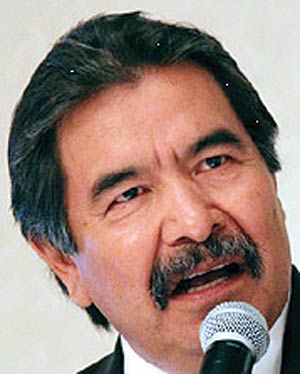Hale touts experience while seeking 2nd term
By Cindy Yurth
Tséyi' Bureau
CHINLE, Aug. 21, 2014

(File photo)
Albert Hale
Albert Hale, D-District 7, is running for a second term in the Arizona House of Representatives. He faces two other Diné in the Democratic primary: Navajo Nation Council Delegate Joshua LaVar Butler (Tó Nanees Diz’) and retired judge Jennifer Benally.
While Hale had nothing bad to say about either candidate in a recent telephone interview on his way back from a national caucus of Native American state legislators, he did say the current political climate does not leave much room for a learning curve.
"Both houses are dominated by Republicans and we have a Republican governor," explained Hale, 62, who is 'Ashiihi (Salt Clan) born for Tó Dich’inii (Bitter Water Clan). "It makes it more difficult. I'm used to working with people across the aisle."
Hale served in the Arizona State Senate from 2004 until 2011, when term limits forced him to run for the House instead. Although he initially challenged Carlyle Begay's residency when Begay was appointed last year to fill Jack C. Jackson Jr.'s unexpired term in the senate, Hale said he ultimately decided to run for the House again instead.
"There's a lot more activity on the House side," he said. "Besides, we need (Navajo) representation in both houses."
Among his accomplishments during his first term as a state representative, Hale listed securing $2 million in state funds to build the Dilkon Judicial District building, and coming within one vote of getting a $4 million appropriation for the Navajo Nation Supreme Court building.
"I had support for it, and then the speaker (Andy Tobin) changed his vote at the last minute," Hale lamented. "We lost it by one vote."
But in a deep red state like Arizona, Democrats count "almosts" like that as victories. Hale also says that each year he garners more support for allocating a portion of the transaction privilege tax, a state sales tax, to the state's Native American tribes.
Twenty-five percent of the tax goes to incorporated cities and towns, "and, as you know, there's no such animal on the Navajo Nation," Hale said.
So when Navajos buy stuff in Arizona, they're supporting parks, libraries and recreation centers in places like Eagar, Springerville and St. Johns.
"We need the same things for our kids," Hale said. "I've said a number of times that colonialism is alive and well in Arizona."
Of course, the municipalities aren't going to part with any of their share of the TPT without a fight.
"I will continue to push that" if elected, Hale promised. "I will sponsor that bill again and I will ask the Indian nations for their support."
Hale says he'll also keep an eagle eye out for discriminatory bills, which are more subtle since the days of SB1070, which required immigrants to carry identification at all times and gave police officers the authority to ask for it simply if they became suspicious someone was an illegal alien.
These days, "you have to be vigilant" to spot a racist piece of legislation. For instance, a recent bill that would have allowed a business to refuse to serve a person whose lifestyle violates the business owner's religious beliefs (say, if the customer is gay and the business owner is a fundamentalist Christian) "could arguably be used against people of color," Hale said.
Now that Arizona is in the black after years of fiscal crisis, could it be a good time to funnel more money to the tribes?
It's always a hard sell, Hale said.
"We fight about money when there's money, and we fight about money when there's no money," he said. "The little increase in the amount of revenue coming in will probably be used to backfill the programs that were cut during the lean years. Anything new will be looked at as taking money away from those programs."
Still, Hale promised, he will do his best if voters give him a second house term.
But the important thing, he said, is for Navajos to get out and vote.
"And voting isn't the end of it," he added. "When you send someone to the Legislature, you need to continue to support their efforts to help you. When there's a call for action on the TPT, for instance, be there to get a resolution passed in your chapter."
How to get The Times:

